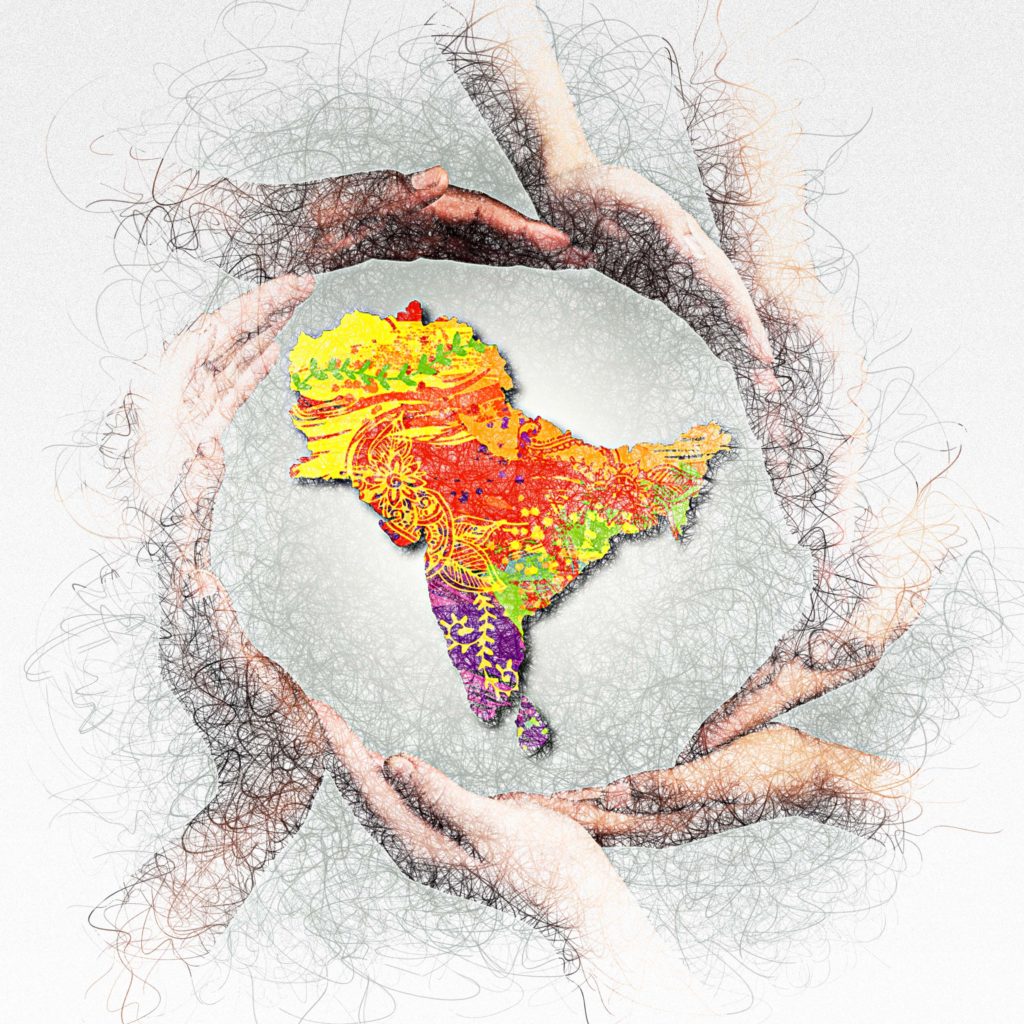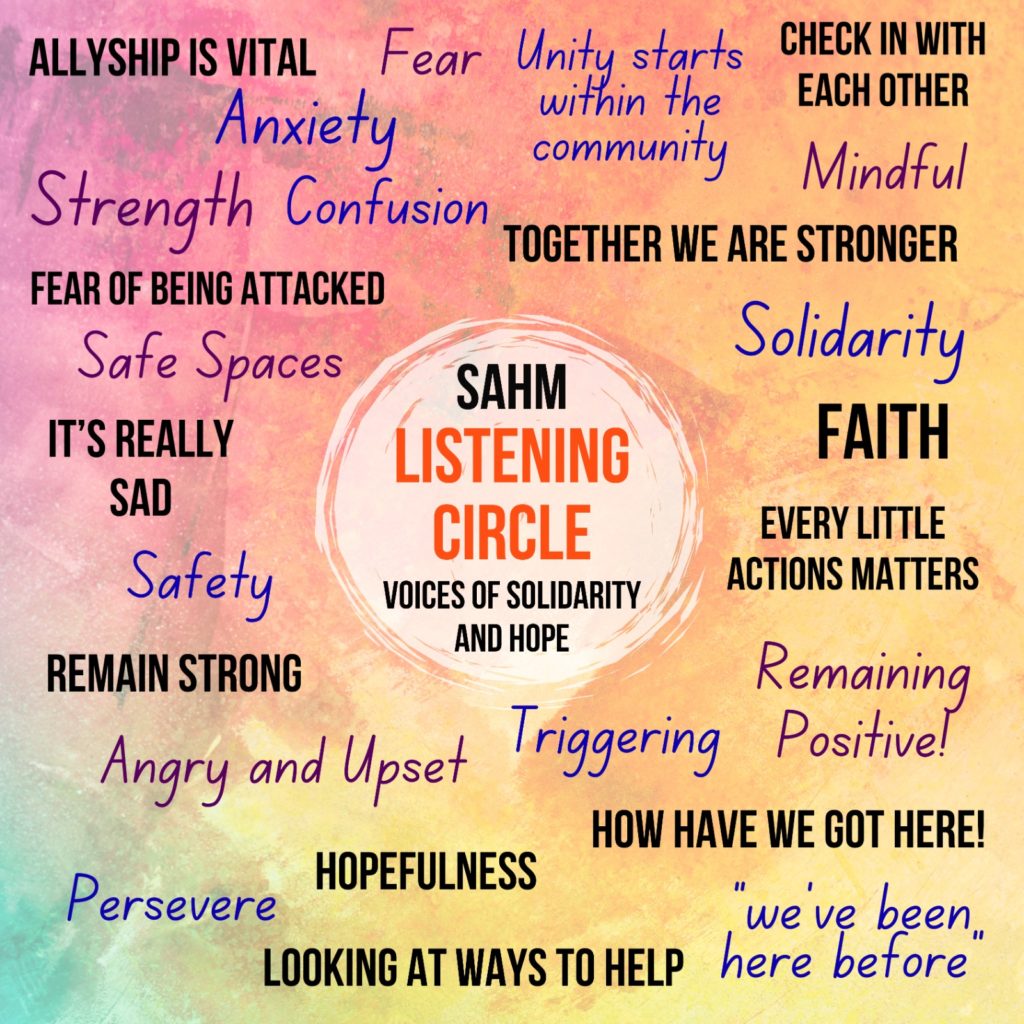Safe and Supportive Spaces
Hosting a South Asian Heritage Month (SAHM) Event
Hosting a South Asian Heritage Month (SAHM) event might feel different than when you first started planning. Here are some important considerations to ensure a safe and meaningful event:
- Be aware some may be experiencing fear or anxiety coming to your event.
- Check with the venue about their safety plans.
- Ensure you have contact information for the organising committee available.
- Check in with your teams to understand how they are feeling.
- Stay informed about the local situation and reassess if necessary.
- If a situation arises, call emergency services at 999.
- Providing spaces to Celebrate, Commemorate, Educate is just as important now, so we continue with South Asian Heritage Month. If you need support, reach out at info@southasianheritage.org.uk.
Running Your Own Listening Event
On Tuesday evening, we hosted a listening event. These events provide a space for people to express their emotions and share their feelings. Here are some guidelines to ensure your listening event is effective and provides a safe environment:
- Do Not Record Online Sessions:
- This ensures that participants feel they are in a safe space, free to express themselves without concern about being recorded.
- Use Chatham House Rules:
- Under these rules, participants are free to use the information received, but neither the identity nor the affiliation of the speaker(s), nor that of any other participant, may be revealed. This promotes openness and honesty in discussions. Find out more about Chatham House Rules here.
- Ensure People Feel Heard:
- Actively listen and acknowledge the contributions of each participant. Make sure everyone feels their voice is valued and respected.
- Give Space and Time for People to Talk:
- Allow ample time for each person to speak without interruptions. Respect pauses and silences as they can be important for processing emotions.
- Check In with People After the Event:
- Follow up with participants to see how they are feeling and offer additional support if needed. This shows care and reinforces the sense of community.
Workplaces
If you’re unsure how to manage support in the workplace, we have excellent resources from various organisations. These can help you provide the necessary support during this time.
Check in with your colleagues
What are meaningful check-ins? (written by Sadia Siddiqui – D&I Consultant)
- Acknowledge the situation: Discuss what has happened/is happening and why it happened. This means acknowledging the racist nature of these riots. Ignoring this fact would be disingenuous.
- Offer support: Ensure they know you’re there for them to talk to at any point and that HR also supports them.
- Provide flexibility: Offer them flexibility regarding their commute and/or the opportunity to work from home.
- Ongoing support: Continue to check in with them throughout the week in a manner appropriate to that colleague.
- Respect their space: If they are quiet, allow them to process what is happening and the feelings it is bringing up.
Things to avoid
- Rushing the conversation: Don’t squeeze it in while running to a meeting. This is not a throwaway chat.
- Centering yourself: Avoid centring the conversation on your feelings and perspective. This is about giving people space to process and share.
- Singling individuals out: If your team isn’t ethnically diverse, a public check-in versus a 1:1 might feel like an unnecessary spotlight.
- Expressing surprise:Don’t communicate surprise at what has happened. The communities impacted are shocked and frightened, but we are not surprised. This has sadly been years in the making.
Other useful recourse include:
Race Equality Matters shares Some ways you can ensure safety and support for ethnically diverse colleagues
Preach inclusion: Learn more about Islamophobia and how to support your Muslim colleagues.
Talking to Young People
We understand that many young people are affected by current events. Sharing posts via social media and talking to friends can increase their fear and anxiety. Here are a few useful resources we have found:
- NSPCC has a helpful article on talking to children about Racism https://www.nspcc.org.uk/keeping-children-safe/support-for-parents/children-race-racism-racial-bullying/
- Young minds looks at Racism and Mental Health https://www.youngminds.org.uk/young-person/coping-with-life/racism-and-mental-health/
- Show Racism the Red Card are the UK’s leading educational anti-racism charity and have and Education Hub, created specifically for teachers and educators. Home | Show Racism the Red Card |#WRD24 (theredcardhub.org)
Explaining the Current Situation to Workplaces
Many workplaces may not fully understand the situation or the fear you might be feeling. It can be challenging to articulate this. We have written a short example to help you communicate with your superiors.

Example Letter:
The violence across the UK over the last few days has left many people of colour feeling deeply fearful, hurt, and scared. We are devastated, angry, and terrified by the events unfolding around us. Our children are frightened, and we constantly receive messages from loved ones who share the same fears. The thought of being attacked as we go about our everyday lives, including simple tasks like going to the shops or coming to work, has become a terrifying reality. The overall climate of uncertainty is overwhelming. Without the support of our company, we feel isolated and alone during this time.
We need our organisation to be a pillar of support and understanding. It is vital to offer flexible work arrangements, prioritise the safety of all staff, and create safe spaces for open dialogue. We can’t pretend everything is normal when we are exhausted, our mental health is strained, and our nervous systems are on high alert.
Please, take the time to listen and empathise with our employees. Take concrete steps to support us during this challenging period. South Asian Heritage Month has gathered some useful resources to help workplaces navigate these times here. By standing with us and showing genuine care, you can support us during this time.
Thank you for your attention to this matter.
 South Asian Heritage Month dates changed to "July" from 2026 — Learn more here →
South Asian Heritage Month dates changed to "July" from 2026 — Learn more here →






